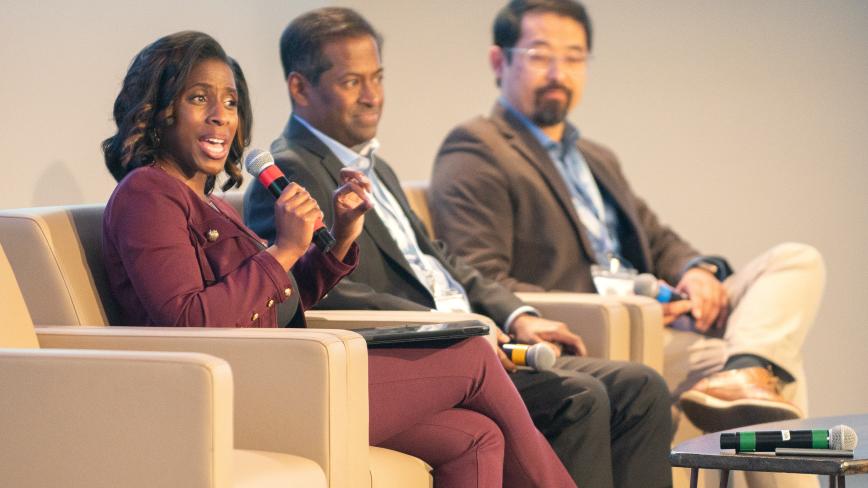“We can’t impact what we can’t see,” said Naveen Raja, D.O., MBA, chief medical officer of UCR Health.
His words reflected a shared belief: that data insights are foundational for delivering high-quality care to every patient. Achieving the health results that matter most to patients is a core measure of success at UC academic health centers, and these efforts are increasingly powered by data innovation.
During the panel at the UC Health CDI2 conference: “Data-driven Solutions for Patient Engagement and Health Equity,” three UC academic health center leaders shared how they’re implementing innovative data collection and digital literacy programs to improve care, overall patient experience and health education.
Enabling proactive care that puts the patient first
To better understand the outside factors and challenges that impact people’s health, UCLA Health care teams have introduced a new electronic self-reporting tool for their patients. This new tool, which gathers demographic information from patients and layers in data from outside sources about economic and social conditions in the patients’ communities, offers deeper insights for health professionals. For patients navigating chronic conditions, like heart disease and diabetes, who may have frequent hospitalizations, the data-driven, patient-centered approach provides more information to health care professionals that enables them to align care strategies with a person’s everyday realities. This combination of self-reported information and community data is assisting clinicians in developing more targeted, proactive health management approaches that can lead to health improvements while also preventing visits to emergency departments and additional hospitalizations.
With similar proactive health management goals in mind, UC Davis Health teams have led a digital health initiative to increase digital literacy and access to health education. In partnership with community health workers (promotores) and farm owners, this initiative aims to provide agricultural workers with hands-on, community-specific training about navigating mobile, digital health tools. The program also equips people with health education tips and tools that they can use to manage their health as part of their daily routines.
To improve access to care for families, UCR Health has implemented a new "Express Lanes" tool powered by electronic health records. This new tool helps providers conduct efficient patient visits, ensure patients receive all services, and monitors the quality of care that was provided. This operational innovation is a clear example of how data insights can help clinicians improve a patient’s experience.
Elevating maternal health through data insights
UC Health is also focused on improving maternal care, with teams working together from multiple UC locations to reduce serious health complications for mothers by studying anonymous patient data from across the system.
Through data analysis collaboration with CDI2, UC Health academic health centers are working to increase access to prenatal visits and identify opportunities to prevent complications during labor, delivery and post-partum phases.
Speakers on the panel also emphasized the role of community engagement when leveraging data insights and taking action to improve health outcomes. For example, UCLA Health is leading the way in working with community-based partners to advance wrap-around maternal health programs, like the UCLA Health Maternal Outpatient Mental Health Services (MOMS) Clinic, to connect patients with perinatal care, especially in regions where those resources can be scarce. These programs, powered by insights from shared data sets, reflect how coordinated innovation can produce safer outcomes for mothers and infants alike.
From insight to impact
Technology is driving measurable progress across industries, but as the panelists reminded us, we must continue to apply it responsibly and ethically to ensure long-term, equitable impact.
As Medell Briggs-Malonson, M.D., MPH of UCLA Health and UC Health put it, “Technology can be a powerful tool for accountability and transformation, but only when it affirms the experiences of those it serves.”
Through innovation, partnership, and responsible data use, UC Health is demonstrating how insight, when applied with care, leads directly to impact.
About University of California Health
University of California Health comprises six academic health centers, 21 health professional schools, a Global Health Institute and systemwide services that improve the health of patients and the University’s students, faculty and employees. All of UC’s hospitals are ranked among the best in California and its medical schools and health professional schools are nationally ranked in their respective areas.


